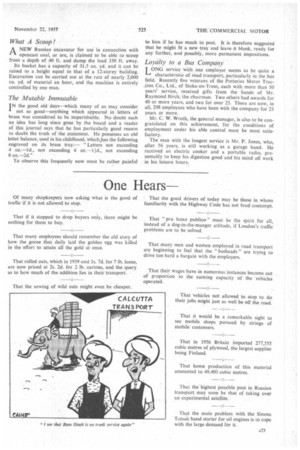One Hears—
Page 25

If you've noticed an error in this article please click here to report it so we can fix it.
Of many shopkeepers now asking what is the good of traffic if it is not allowed to stop.
That if it stopped to drop buyers only, there might be nothing for them to buy.
That many employees should remember the old story of how the goose that daily laid the golden egg was killed in the effort to attain all the gold at once.
That rolled oats, which in 1939 cost Is. 7d. for 7 lb. loose, are now priced at 2s. 2d. for 2 lb. cartons, and the query as to how much of the addition lies in their transport.
That the sowing of wild oats might even be cheaper.
That the good drivers of today may be those in whom familiarity with the Highway Code has not bred contempt.
That "pro bono publico" must be the spirit for all, instead of a dog-in-the-manger attitude, if London's traffic problems are to be solved.
That many men and women employed in road transport are beginning to feel that the " hotheads " are trying to drive too hard a bargain with the employers.
That their wages have in numerous instances become out of proportion to the earning capacity of the vehicles operated.
That vehicles not allowed to stop to do their jobs might just as well be off the road.
That it would be a remarkable sight to see mobile shops pursued by strings of mobile customers.
That in 1956 Britain imported 277,555 cubic metres of plywood, the largest supplier being Finland.
That home production of this material amounted to 49,400 cubic metres.
That the highest possible post in Russian transport may soon be that of taking over an experimental satellite.
That the main problem with the Simms Tenscc hand starter for oil engines is to cope with the large demand for it.




























































































